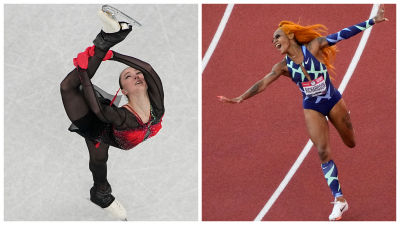US sprinter's ban over cannabis 'very different' to allowing Valieva to continue competing, IOC says

The banning of a US sprinter from the Tokyo Olympics after she tested positive for cannabis is a "very different" case compared to allowing Russian skater Kamila Valieva to continue competing at the Winter Games despite the 15-year-old testing positive for a performance-enhancing substance, the ruling committee has said.
The comments from the International Olympic Committee (IOC) come after Richardson, who was banned from competing last year for a month which included the Olympic Games, questioned a decision to allow Valieva to continue competing at the Winter Olympics amid an ongoing doping case and suggested the decision was down to race.
"Every single case is very different. She (Richardson) tested positive on June 19 (2021), quite a way ahead of the Tokyo Games," IOC spokesperson Mark Adams said. The Tokyo Olympics, delayed by a year due to the pandemic, started on July 23. "Her results came in early order for USADA (US Anti-Doping Agency) to deal with the case on time, before the Games. Ms Richardson accepted a one month period of ineligibility which began on June 28."
"I would suggest that there isn't a great deal of similarity between the two cases," he said. Richardson was expected to be one of the biggest draws in Tokyo after winning the 100 metres in 10.86 seconds at the US trials.
She is reported to have said she used the drug after hearing from a reporter that her biological mother had died - a week before Olympic trials were due to begin.
The 21-year-old tested positive at the US Olympic trials in Oregon - a state where cannabis is legal. However, one of the chemicals it contains, THC, is banned in athletics.
It is thought marijuana can help athletes relax and increase their confidence before a race, but other studies suggest it is likely to have a negative impact on physical performance.
Meanwhile, Valieva tested positive for trimetazidine on Christmas Day, a medication which is used to treat angina but is on the World Anti-Doping Agency's list of banned substances as it increases blood flow efficiency and improves endurance.Chinese swimmer Sun Yang and Nigerian sprinter Blessing Okagbare are among those sanctioned for its use. Okagbare was suspended during the Tokyo Games.
As Valieva is under-16 and so a "protected person" under WADA rules, the Court of Arbitration for Sport (CAS) ruled on Monday that she does not need to be provisionally suspended ahead of a full hearing into her positive test for trimetazidine.
"Exceptional circumstances”, including Valieva's age, “serious issues” in the process of notifying the teenager of her result - despite the test being conducted on December 25, Valieva was only notified of the result on February 8, a day after she won gold in the team event - and the fact a suspension could cause her “irreparable harm”, were cited by the CAS as behind its decision to allow her to continue competing at the Games.
After the court ruling was announced earlier this week, ITV News Asia Correspondent Debi Edward explained what it means
While Valieva is allowed to continue skating, a full hearing will be heard at a later date by the Russian Anti-Doping Agency (Rusada), meaning she could be retrospectively stripped of her medals.
However, in 2019, WADA banned Russia from international sports events for four years after the country was found to be running a years-long state-sponsored doping scheme. It is the reason why Valieva is competing as part of the Russian Olympic Committee team.
WADA will investigate Valieva's coach, Eteri Tutberidze, along with the rest of the entourage.
Following Monday's ruling, Richardson had demanded an answer from the IOC over Valieva's continued participation. "Can we get a solid answer on the difference of (Valieva's) situation and mines?" Richardson wrote on Twitter on Monday.
"My mother died and I can't run and was also favored to place top 3. The only difference I see is I'm a black young lady."
"It's all in the skin," the athlete wrote in another post.
"Failed in December and the world just now know however my result was posted within a week and my name & talent was slaughtered to the people," Richardson said in another tweet.